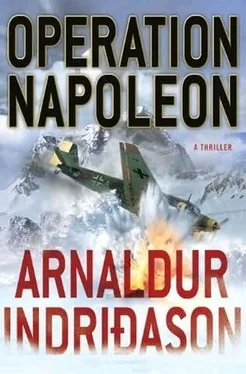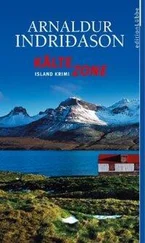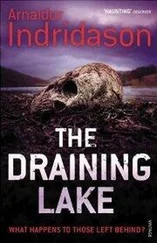What convinced her was the thought that Steve had died because of this knowledge. He was in her mind every day and she relived his death over and over again, during her waking hours or in her dreams. He had left a void in her life that would never heal, nor would she have it any other way. But if the matter ended like this, he would have lost his life for nothing, and that she found unbearable.
It was a ship’s captain who first made her consider the possibility seriously. He engaged her to handle his divorce and a sort of friendship had developed between them. He was captain of a merchant vessel and once confided in Kristín that he had helped a young Icelandic woman flee her husband with her two children by smuggling her from Portugal to Iceland. Kristín could have chosen an easier way and flown to Argentina via Spain or Italy, but she did not dare. Did not dare risk the surveillance cameras, the passenger lists, passport control.
Even after taking the decision she did nothing precipitate. She tried as far as possible always to use cash, never credit or debit cards for transactions, to avoid places with CCTV, including some streets in the city centre where the police had installed cameras, and never used the internet at home. She fled from every aspect of the surveillance society.
She went about it as if she were organising a long holiday. The island existed, after all; she had located it with the help of the British Royal Geographical Society, whose website she visited at the National Library. Their information about the island was mainly of geographical interest, although it included a brief description of its history and the coordinates for its exact location. She considered flying to South America via Europe, or travelling there via a variety of other routes but none of these had the same attraction of invisibility.
When her friend the captain told her one day that he would shortly be sailing to Mexico to deliver an Icelandic trawler to its new owner, she decided to enlist his help. Initially he refused because she would not explain why she wanted to stow away on board his ship and slip ashore unseen in Mexico. The captain was not unaccustomed to taking passengers – there were always people who were afraid of flying and preferred to sail on merchant ships – but he wanted nothing to do with anything illegal.
She never knew why he changed his mind but one day he came and agreed he would help her, if that was what she wanted. She had asked it as a favour of a friend, he said, and who was he to deny her?
Until the very last minute she dithered about whether to go. In the end, however, she reasoned that she was approaching forty and would never make the trip if not now. The only person she told was her brother Elías. She did not want to get Júlíus involved, the way she had with Steve. She could manage her brother, but Júlíus was another matter.
The ship sailed early in the morning. She stood on deck, watching the land sink below the horizon. It was summer and her face was warmed by the sun which had already been up for several hours. The voyage was uneventful and when the ship docked at a small town on the east coast of Mexico, she managed to slip ashore without passing through customs or immigration. She had enjoyed long conversations with the captain during the voyage and they parted on good terms.
She selected a reliable car, paid for it in cash, and drove south through Mexico like any other tourist, sleeping at motels, seeing the historical sites, lingering here and there to enjoy the scenery, to savour the national cuisine and hospitality. During the journey she felt more relaxed than she had allowed herself to feel in a long time. It was delightful to be abroad again.
Several days later she reached Buenos Aires. Evening had fallen by the time she drove into the capital city. She found herself a room at a reasonably priced hotel and purchased a detailed road map on which she marked out the route south. She was confident that she was not being followed, that she had managed to make it to Argentina unremarked.
Two days later she set off from Buenos Aires. She sold the car and made the first leg of the journey by plane, landing that afternoon at Comodoro Rívadavía in the middle of Patagonia. There she bought a bus ticket and calculated that the journey to the south of the country would take a further three days. The route ran for the most part along the coast. She stayed the first night at Caleta Olivia, travelling the next day through the farming settlements of Fitzroy and Jaramillo, from where she headed due south across the Rio Chico and by ferry across the Magellan Straits to the town of San Sebastián in Puerto Harberton, a town of about 15,000 people just north of the Chilean border.
She arrived towards evening and took a room at a small hotel. The following day she walked down to the harbour and found a sailor who spoke a little English. He was in his fifties, bearded and toothless, and reminded her pleasingly of an Icelandic fisherman. She asked about the island and he nodded, waving his arm in a wide arc. It was a long way out, she gathered. They negotiated a fee and agreed to meet early next morning to sail out to the island.
She spent the day strolling around the town, browsing the shops and the market. Noticing other tourists, she did her best to mingle. Although it was out of season, she had met countless travellers on her journey through the country; no matter how small the backwater, they could be found examining wares and lounging in cafés.
The fisherman was waiting for her down by the harbour next morning and as they sailed out in his little boat the day was perfectly calm, the air warm on her skin. She paid half the fare in advance; he would get the rest when they returned, as they had agreed. She tried to question him about the island’s history but he seemed completely uninterested, saying dismissively that he knew nothing about Borne, that there was nothing to know.
They chugged along at a comfortable speed past rocks, islets and archipelagos for about five hours until finally he nudged her and pointed ahead. She watched the island rise out of the sea, surrounded by a few smaller skerries. It reminded Kristín of the rugged Icelandic island of Drangey, not as high but at least three times larger, an inhospitable rock supporting some vegetation but no bird life at all. It was enveloped by silence. They sailed round the island until the fisherman thought he spied a place where Kristín could clamber up the cliffs. He intended to stay behind in the boat.
In the event it was not a difficult climb; a gravel path led from the beach to the cliffs where there was a fairly easy incline to the top. On reaching the plateau, she saw some ruins in the middle of the island and headed that way. As she got closer she observed tumbledown wooden walls, a beaten-earth floor and a doorstep. She made a circuit of them, noticing something that reminded her of an old kitchen hearth. The island had indeed been occupied in earlier centuries.
She walked among the remains, searching carefully for any clue that might support her suspicions. But in vain; there was simply nothing there. She was surprised to find that this prompted no sense of disappointment in her, despite the journey halfway round the world. Afterwards she walked the length of the island to the brink of the precipice and gazed at the waves breaking on the cliffs while the sea breeze caressed her face. For the first time in years she felt a weight lift off her chest.
Turning round, she retraced her steps through the ruins. A short distance beyond them, on the way back to the waiting boat, she tripped on a rock lying buried in the long grass. She glanced down and was about to carry on – the fisherman would be wanting to leave – when she noticed its shape. It was no ordinary rock. It was thin, about half a metre long, square at the bottom and rounded at the top. She looked down at it in puzzlement, before crouching and trying to turn it over. It was heavy but with some effort she managed to raise it on its edge, then let it fall back on to the other side.
Читать дальше












